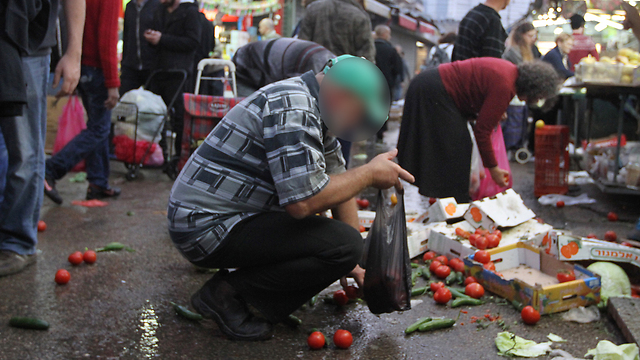
Archive photo
Photo: Motti Kimchi
The National Insurance Institute of Israel's (NII) annual poverty report, which was submitted on Wednesday, shows a decline in the number of poor children and seniors and a rise in the number of poor families in Israel.
The rate of poor families in Israel in 2015 was 19.1%, a rise from the 18.8% of the preceding year. Contrarily, the comprehensive rate of poor persons dropped from 22% to 21.7%, the rate of poor children from 31% to 30%, and the rate of poor senior citizens from 23.1% to 21.7%.
In 2015, 460,800 poor families, and 1,712,900 poor persons including 764,200 children lived in Israel. The poverty line that year was NIS 3,158 per month for a single person living alone and NIS 5,053 for a couple without children. A couple with three children needed to earn more than NIS 9,475 per month to not be considered poor.
In 2014, the number of poor persons in Israel was 1.709 million with 444,000 poor families.
In 2015, women, at a rate of 18.4%, were still poorer than men at 17%.
While 2015 saw fewer poor citizens, they were poorer than previously. The rate of severity and depth of poverty, which checks the gap between a family's income and the poverty level, increased from 34.6% in 2014 to 35.7% in 2015. If in 2014, 58% of poor families were in a prolonged period of poverty (that is, unable to escape the circle of poverty), in 2015, that datum rose to 60%.
In poor families with five and more children, the rate of prolonged poverty is 84%.
Alternative report
According to figures collated by NGO Latet, 35% of Israeli children live in poverty while just under 30% of the entire population lack basic commodities or access to services required for a basic lifestyle.
The Arab sector experienced a rise in poverty from 52.6% to 53.3%. The ultra-Orthodox, however, experienced a decrease from 54.3% to 48.7%, which can be attributed to an increase in benefits for families with children and also to an increase in salaries.
According to the report, Israel is still in first place on the OECD's poverty and inequality scale. Welfare Minister Haim Katz commented, "I will recommend that the government change its method for updating benefits so that they will be based on the rise in the standard of living and no longer updated according to the consumer price index. It's absurd that the average national wage is rising while the value of benefits hasn't been updated in four years."

















